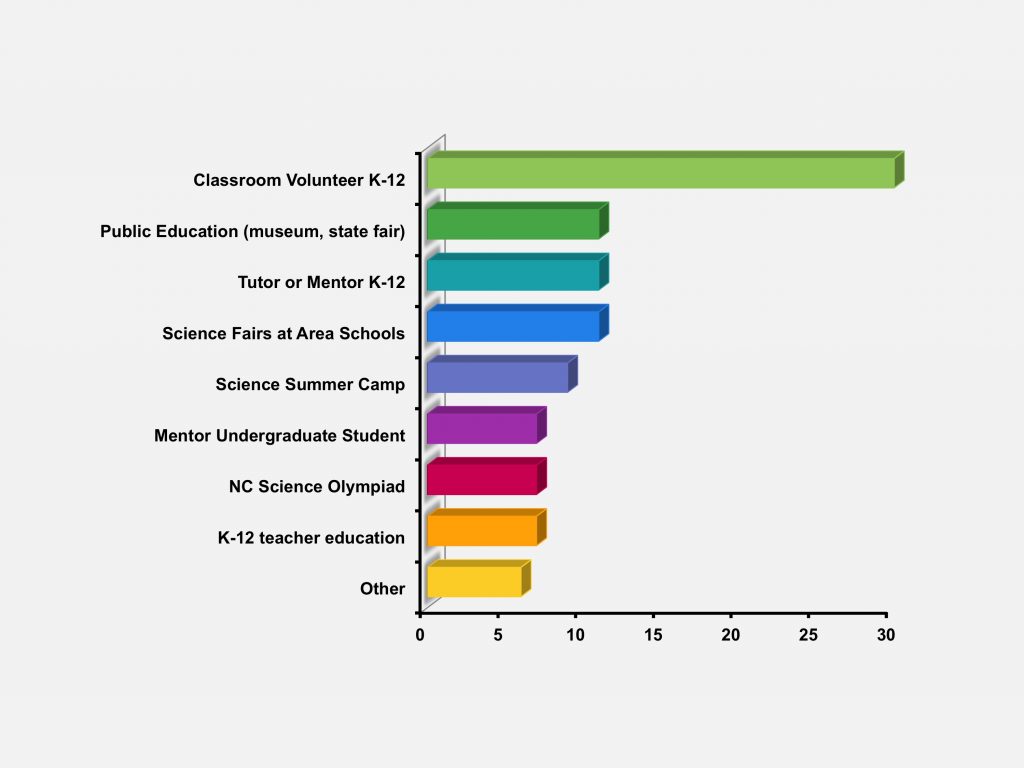Community Service
Trainees propose and complete a community service project that is intended to foster the development of biotechnology by encouraging this career route among K-12 or undergraduate students. In addition to mentoring undergraduate research projects, some students have brought demonstrations and experiments directly into classrooms at the elementary, middle and high school levels. This element of the program has proven to both enrich community activities and provide a truly positive experience for the trainees; many students continue their community service work throughout their graduate training.
Examples of service projects:
- Volunteer at NC Science and Engineering Fair
- Volunteer for Bugfest at NC Museum of Natural History
- Event Assistant at the NC Science Olympaid State Tournament
- State Science Fair Judge
- Presentations at Expanding Your Horizons conference
- Volunteer at a Sally Ride Science Festival
- Volunteer at BEST Fest at NC Museum of Natural Sciences
- Judge at NC Odyssey of the Mind
- Women and Mathematics (WAM) mentoring
- Training a Kenan Fellow (high school teacher) for research in classrooms
- Workshops and tutoring for Boys and Girls Club of Wake County, NC
- Volunteer for the Food Science Chapter of the NCSO
- BioFrontiers Presentation at NC State Fair
- NC Summer Science and Mathematics volunteer
- K-12 tutoring in math and science
- Volunteer for Science and Technology Activities in Rural Schools (STARS)
- Chemical Engineering at summer camp: Engineers Helping the World
- Judging science fairs at local public schools

Trainee Highlight: Laura Lee, PhD Candidate in Chemical & Biomolecular Engineering: “As part of my volunteering efforts for the NIH MBTP, I have had the wonderful opportunity to lead the Food Science Event in the Charlotte Regional Science Olympiad. While organizing and running this large event has given me invaluable experience in team management, the true value of volunteering has been to see the excitement of science education first hand. Not only are middle-schoolers tested on basic science principles of something they commonly encounter in their daily lives (food), but I lead them through the scientific method: the basis of my graduate research. The difference I am making in these students’ lives is obvious by the amount they learn and the enthusiasm for science they gain in these events; both are reasons I still continue to volunteer despite my fellowship being finished.”
Trainee Highlight: Jake Dums, PhD Candidate in Plant & Microbial Biology: “Our lab hosted a high school teacher, Mark Townley, who was awarded a Kenan Fellowship. As part of his fellowship, Mr. Townley created a curriculum that introduced biofuels and the need for them to high school students both at his school and at other schools in the state of North Carolina. I helped him develop several lab and class activities involving growing and harvesting algae for biofuel production. Students will learn to properly prepare a growth medium and how to sterilize it. They will then grow algae in small photobioreactors made out of water bottles. Students will then collect the algae and burn the algae to show that algae are a viable biofuel feedstock. We determined that oil collection from the algae would be too difficult with limited high school lab supplies. As part of the project the students will do a life cycle analysis of the algae to determine energy and resource inputs versus outputs. Students will also participate in a debate which will compare pros and cons of the different kinds of biofuels, alternative energy, and conventional fuels like gasoline. My adviser and I visited Mr. Townley’s class to give a short presentation on our algae research and answered questions from the students.” The curricula developed with Mr. Townley is available at the following links:
https://kenanfellows.org/how-much-gasoline-does-it-take-run-bio-fueled-engine/
https://kenanfellows.org/biology-biofuels-creating-diesel-algae/